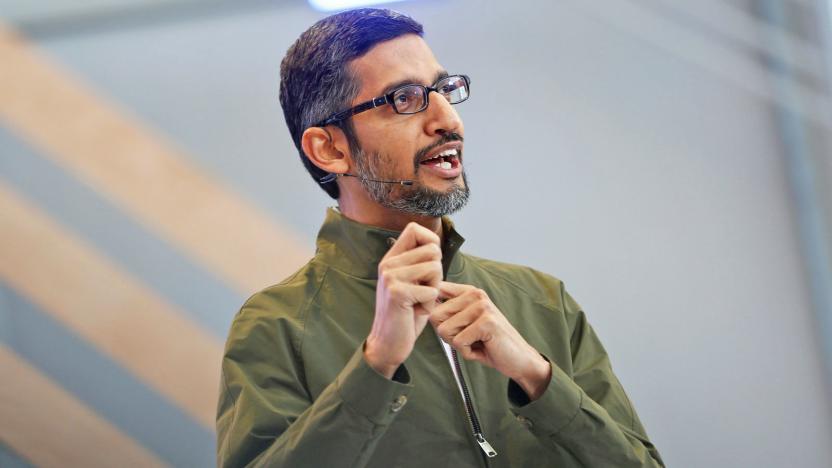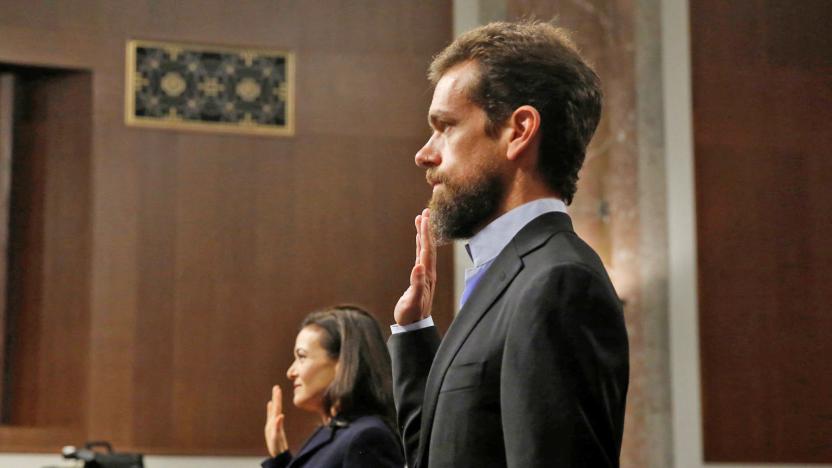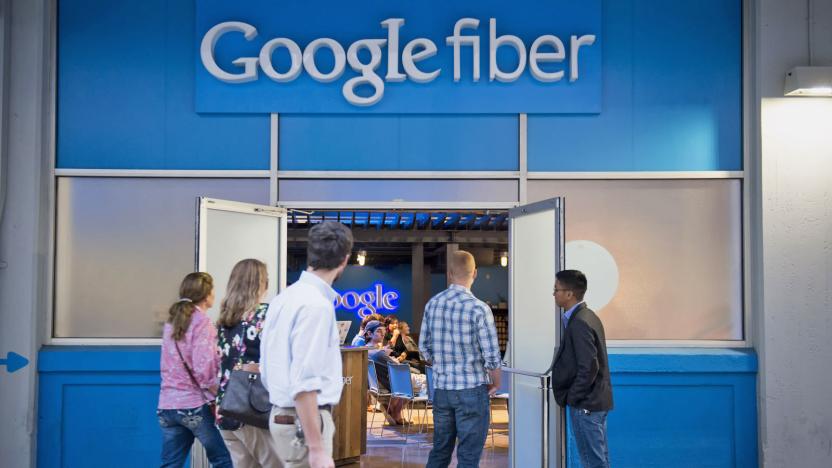larrypage
Latest

Lawsuit accuses Google of hefty payouts to execs accused of misconduct
Google's handling of sexual misconduct by executives is coming under more scrutiny thanks to new details emerging from a shareholder lawsuit. Investors have claimed Google chief Larry Page granted Android creator Andy Rubin a $150 million stock grant without seeking approval of the board first, even though Rubin was under an investigation at the time. Page instead got "rubber stamp" approval eight days after the fact, according to the suit. It's not certain if he was aware of the investigation.
Jon Fingas03.11.2019
Larry Page's air taxi company cuts a deal with Air New Zealand
Remember Google co-founder Larry Page's other "flying car" project that's based in New Zealand? It's called Cora, and is being developed by Zephyr Airworks to provide an autonomous VTOL-capable flying vehicle. Now the local airline Air New Zealand has signed an agreement that "signals the intention to form a long-term relationship" to build the world's first autonomous air taxi service. That's a tall order, considering how many others, like Uber Elevate, are working on similar ideas, but partnering with an airline could assist in lining up the regulatory and community support to get this project going. As far as what the deal actually includes now, the FAQ explains it's "a commitment to jointly explore the development and design of an electric, autonomous air taxi service, using Cora."
Richard Lawler10.16.2018
Larry Page's third flying car company will sell its first craft in 2019
We've heard a bit here and there about Opener, one of the flying vehicle startups backed by Google's Larry Page. Opener specializes in vertical take off and landing (VTOL) vehicles, similar to helicopters and drones, and the company is counting on the idea that these vehicles will one day be inexpensive enough to be a common form of transportation, according to CNBC.
Swapna Krishna10.12.2018
Google’s CEO will testify before Congress about bias and China
Google CEO Sundar Pichai will testify before the House Judiciary Committee in November, following the midterm elections. He met with House Majority Leader Kevin McCarthy and other senior Republicans Friday to discuss accusations that Google is biased against conservatives (a charge the company has denied). McCarthy told Reuters that Pichai had agreed to appear before the committee.
Kris Holt09.28.2018
Are Facebook and Twitter scared enough to work together?
The last time a bunch of social media execs testified before congress the hearings ended with US House Representative Ted Lieu (D-CA) calling it a "dumb" and "stupid" sideshow. He said there were more important matters for Congress to be discussing the "content-filtering practices" of internet companies, and that Facebook, Twitter and Google can't have user posts be regulated because of the First Amendment anyway. Still, members of the Senate and House are keen on finding ways for Silicon Valley giants to keep their services safe, particularly from foreign interference and other bad actors trying to create discord among Americans. But rather than get into a battle with Congress over potential federal regulation, which would likely cause some controversy, Facebook and Twitter seem willing to work together on solutions for these issues in order to avoid that path.
Edgar Alvarez09.06.2018
Opener is the latest startup to reveal plans for a personal aircraft
The race to build a "flying car" has just become more crowded. This week, the Canadian company Opener revealed its new vehicle, called BlackFly. The one-person aircraft can travel up to 25 miles at a speed of 62 miles per hour. Because the operations are a simple joystick, according to the release BlackFly shouldn't require a pilot's license, though operators will require training.
Swapna Krishna07.14.2018
Larry Page's autonomous air taxi 'Cora' flies in New Zealand
Reports surfaced in 2016 that Google co-founder (and now Alphabet CEO) Larry Page had two "flying car" projects in the works, and while we saw the Flyer recreational vehicle unveiled last year, today it's time to meet Cora. An "air taxi" developed by Page's Kitty Hawk company, the electric aircraft is intended for use as part of a transportation service instead of sale to individual users. It's built to use self-flying software, and uses 12 lift fans for vertical take-off and landing (VTOL) like a helicopter, so there's no need for a runway.
Richard Lawler03.13.2018
Dow Jones reported a fake story about Google buying Apple
As 9to5Mac reports, the Dow Jones newswires had a bit of a shakeup this morning after a "technical error" led to the announcement of some rather ridiculous fake news. Dow Jones reported that Google would be buying Apple for a mere $9 billion -- which would be quite a steal if true -- and that the deal was struck between Alphabet CEO Larry Page and the late Steve Jobs. The report went on to say that Google employees would be moving into Apple's "fancy headquarters" and that Google employees said, "Yay."
Mallory Locklear10.10.2017
Uber sought a Google partnership before they became bitter rivals
New court filings in the Waymo v. Uber lawsuit document the breakdown between the two companies' cooperation and potential partnership. The filings contain a series of emails between former Uber CEO Travis Kalanick and Google senior VP David Drummond, who at the time was also an Uber board member. The exchange, which happened in early 2015, show Kalanick becoming increasingly concerned over rumors that Google was looking to start its own ride-sharing service with the self-driving cars it was developing. From the emails, it appears that Uber was looking to partner with Google in its autonomous vehicle efforts and Kalanick, worried about the rumors, repeatedly sought a meeting with Alphabet CEO Larry Page.
Mallory Locklear07.07.2017
Kitty Hawk's Flyer isn't the flying car you were promised
That flying car startup Google's Larry Page is backing? It's finally showing its hand... and the company's initial product is both more and less than what you might expect. Kitty Hawk's first publicly demonstrated vehicle, the Flyer, isn't so much the flying car of sci-fi fame as a recreational vehicle. The one-seat, propeller-driven vehicle is meant for a short flight across lake when you're at the cottage, not commuting to work -- that Jetsons-like future isn't here yet. You won't have to wait long to get it, though. Kitty Hawk expects to start selling the Flyer by the end of 2017. This will be a practical reality within months, in other words. You can already put down $100 to sign up for a $2,000 discount on the finished machine.
Jon Fingas04.24.2017
Google wanted to sell intelligent robot arms (but didn't)
Google (and parent company Alphabet) build a lot more hardware than fancy new smartphones and AI assistants -- it's just that a lot of it doesn't make it out of the lab. Take these advanced robotic arms, for example: Alphabet's robotics group built the arms, which were used in a research project to show how Google's software helps robots learn from each other over time. But despite their apparent usefulness, Alphabet CEO Larry Page decided to cancel plans to sell the hardware because it failed Page's "toothbrush test." As Bloomberg reports, Page only wants to ship products that could be used daily by billions of people, and these robotic arms are significantly more niche than that.
Nathan Ingraham10.06.2016
Google's Fiber rollout isn't going as planned
Google Fiber may have just gone live in Salt Lake City, but the process of laying all that fiber optic cable is reportedly making Alphabet's homebrewed ISP the company's most expensive unit outside of the core Google business. According to a new report from The Information, those costs have prompted Larry Page and Sergey Brin to push Google Fiber away from its original plan and more towards a cheaper wireless standard.
Andrew Dalton08.25.2016
Inhabitat's Week in Green: An impressive mobile home, and more!
Is the age of the flying car upon us? This week a new report revealed that Google co-founder Larry Page has secretly invested over $100 million in two aerial vehicle startups. Meanwhile, four major political parties in Norway have proposed a ban on all gas-powered cars by the year 2025. A team of Swedish students unveiled one of the world's most energy-efficient rail-bound vehicles. A young filmmaker transformed a boring Chevy van into an incredible solar-powered mobile home. And the Coboat is a sun and wind-powered catamaran for co-working freelance nomads.
Inhabitat06.12.2016
Google's Larry Page is secretly developing a flying car
Remember all of those dystopian futures where our skies are filled with grimy flying cars spewing smog across the land? The co-founder of Google is hoping to make that future a reality, at least according to Bloomberg. It's published a report claiming that Larry Page has been secretly bankrolling Zee.Aero and Kitty Hawk, two California startups working on developing a serious flying car. While the former is based on the edges of Google's Mountain View campus, Page's involvement has been considered a secret, until now.
Daniel Cooper06.09.2016
Google is now Alphabet, the owner of Google
The paperwork is filed and it's official: Google has restructured itself into Alphabet. As of the close of business today shares of the old Google are now part of Alphabet, which counts Google as a subsidiary. On our end, this doesn't change much -- unless you're a big fan of Ingress or Pokemon -- but now Sergey Brin and Larry Page can chase innovations in seemingly unrelated areas. Sundar Pichai will keep running day-to-day operations at the new Google, except now with the title of CEO. Google now includes Android, Search, YouTube, Apps, Maps and Ads. Meanwhile, Alphabet can focus on Google Fiber (high speed internet), Calico and Life Sciences (health), Google Ventures and Google Capital (investments), Nest (home automation) and Google X (everything fun, like drone deliveries, self-driving cars and city-wide WiFi). [Image credit: Jeff Chiu/Associated Press]
Richard Lawler10.02.2015
With Alphabet, Google wants to avoid becoming Microsoft
You're probably tired of hearing just how "unconventional" Google is after yesterday's surprise restructuring announcement. Sure, making Google a subsidiary of a company called Alphabet is certainly strange, especially after it's become a household brand practically synonymous with technology culture. But, really, CEO Larry Page's decision to reorient the company makes plenty of sense given just how far Google has come from simply being a search company. On top of wildly popular offerings like Android and YouTube, Google is also exploring things like self-driving cars, delivery drones and even life extension. Now with everything under Alphabet, Page no longer has to justify why a search company is delving into such far-out territory. And that sets up a future where Google can avoid the stagnation so common to big tech companies, and its subsidiaries can be even bolder in their ambitions.
Devindra Hardawar08.11.2015
Google's plan to fix big cities starts with Sidewalk Labs
Google wants to do more than just simplify privacy for its users and put autonomous cars on the road, it wants to "improve city life for everyone." Cofounder Larry Page writes on G+ that with Mountain View's Sidewalk Labs, the company intends to do just that. The plan is to tackle cost of living, transportation efficiency and energy usage by creating and fostering what he calls urban technologies -- stuff Sidewalk says is a bit harder than just relaying traffic conditions or apartment prices. He likens the size of Sidewalk to that of the X lab responsible for Project Loon in terms of investment.
Timothy J. Seppala06.10.2015
Sundar Pichai takes control of Google's crucial products
Well, we guess congratulations are in order. According to Re/code, Sundar Pichai, the senior vice president at Google who used to just be in charge of the Chrome, Android, and web apps teams now basically has control of almost every other Google product division of note. Search? Google+? Ads? Even the company's infrastructure? All of that has been apparently moved off of CEO Larry Page's plate and onto Pichai's -- not a huge surprise considering his heightened prominence within Mountain View over the past months. Pichai, a nine year Google veteran, was even rumored to be one of the leading choices for Microsoft's new CEO, though the role eventually went to longtime company insider Satya Nadella.
Chris Velazco10.24.2014
Google's CEO is pushing for hyper-efficient airports and other moonshots
The Google we already know controls our pockets, makes sense of the web and wants to understand our behavior. That one company already has such extensive reach is pretty crazy, which also raises a weighty question: What would a Google 2.0 look like? According to a new report from The Information, CEO Larry Page has been trying to figure out just that. As the story goes, he rounded up the company's brass over a year ago to suss out what big problems were really worth tackling and to set Google's course accordingly.
Chris Velazco09.18.2014
Google makes sure its founders will survive a Terminator assault
The Connor family may be doing a great job preventing Skynet from becoming self-aware and declaring war on humanity, but Google apparently isn't taking any chances. The internet giant has quietly uploaded a "killer-robots.txt" Easter egg file that tells Terminators to avoid hunting down the company's co-founders, Larry Page and Sergey Brin. There's more to this joke text than stopping murderous automatons from the movies, of course. It's really there to mark the 20th anniversary of robots.txt, the document you put on a site to exclude pages from Google's search crawler. However, it does make us wonder why Google didn't see fit to save people like Andy Rubin or Sundar Pichai -- surely it would expect those behind Android to get some mercy from androids.
Jon Fingas07.05.2014